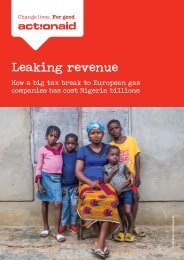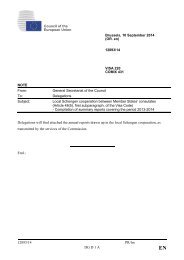- Page 1 and 2:
COMMONWEALTH OF MASSACHUSETTS SUFFO
- Page 3 and 4:
9 Exxon webpage, Meeting global nee
- Page 5 and 6:
24 Exxon: The Road Not Taken series
- Page 7 and 8:
34 Justin Gillis & Clifford Krauss,
- Page 9 and 10:
54 Webpage for National Association
- Page 11 and 12:
COMMONWEALTH OF MASSACHUSETTS SUFFO
- Page 13 and 14:
https://web.archive.Org/web/2016060
- Page 15 and 16:
Than 12,500 Massachusetts Consumers
- Page 17 and 18:
David Hasemyer and John H. Cushman
- Page 19 and 20:
May 28, 2014, available https://www
- Page 21 and 22:
40. Attached to this affidavit as E
- Page 23 and 24:
50. Attached to this affidavit as E
- Page 25 and 26:
Perspectives, May 23, 2016, availab
- Page 27 and 28:
V— '> C0 2 GREENHOUSE AND CLIMATE
- Page 29 and 30:
PROJECTED CARBON DIOXIDE (AS CARBON
- Page 31 and 32:
PROJECTED CARBON DIOXIDE (AS CARBON
- Page 33 and 34: CONCLUSIONS/RECOMMENDATIONS EPA i )
- Page 35 and 36: GROWTH OF ATMOSPHERIC CO2 AND INSTA
- Page 37 and 38: C0 2 GREENHOUSE AND CLIMATE ISSUES
- Page 39 and 40: OUR NEXT TASK IS TO CONVERT THE AMO
- Page 41 and 42: EXHIBIT 2 App. 300
- Page 43 and 44: PARIS AGREEMENT The Parties to this
- Page 45 and 46: (a) "Convention" means the United N
- Page 47 and 48: 8. In communicating their nationall
- Page 49 and 50: Article 6 1. Parties recognize that
- Page 51 and 52: Article 7 1. Parties hereby establi
- Page 53 and 54: (e) Building the resilience of soci
- Page 55 and 56: 5. The Warsaw International Mechani
- Page 57 and 58: 5. Accelerating, encouraging and en
- Page 59 and 60: 4. The transparency arrangements un
- Page 61 and 62: means of implementation and support
- Page 63 and 64: 8. The United Nations and its speci
- Page 65 and 66: the organization and its member Sta
- Page 67 and 68: Article 28 1. At any time after thr
- Page 69 and 70: International Energy Agency ENERGY
- Page 71 and 72: INTERNATIONAL ENERGY AGENCY The Int
- Page 73 and 74: United States, which currently impo
- Page 75 and 76: Trucks deliver a large share of oil
- Page 77 and 78: If nuclear falls back, what takes i
- Page 79 and 80: On bookshop International Energy Ag
- Page 81 and 82: EXHIBIT 4 App. 340
- Page 83: Managing the risks of exposure to f
- Page 87 and 88: EXHIBIT 5 App. 346
- Page 89 and 90: Distribution List: R. W. Cohen M. J
- Page 91 and 92: - 2 - might rise the 0.5 needed to
- Page 93 and 94: Energy and Carbon — Managing the
- Page 95 and 96: 2. World Energy Needs Keep Growing
- Page 97 and 98: ExxonMobil believes that efficiency
- Page 99 and 100: The cost limitations of renewables
- Page 101 and 102: income. For example, by 2030 for th
- Page 103 and 104: A "low carbon scenario" will impact
- Page 105 and 106: In our operations, we apply a const
- Page 107 and 108: technology can be up to 80 percent
- Page 109 and 110: Such stress testing differs from al
- Page 111 and 112: 7. Capital Allocation ExxonMobil ma
- Page 113 and 114: Lastly, we note that even when sens
- Page 115 and 116: Appendix Topic Page Proved Reserves
- Page 117 and 118: EXXONMOBIL RESOURCE BASE - AT DECEM
- Page 119 and 120: EXXONMOBIL CAPEX OUTLOOK (1) Capex
- Page 121 and 122: EXXONMOBIL PRODUCTION PRICES AND PR
- Page 123 and 124: EXHIBIT 7 App. 382
- Page 125 and 126: 2 February 29, 2016 target. First;
- Page 127 and 128: 4 February 20! 2016 the power gener
- Page 129 and 130: 6 February 29, 2016 In addition, wh
- Page 131 and 132: EXHIBIT 8 App. 390
- Page 133 and 134: ExxonMobil's Energy Outlook Project
- Page 135 and 136:
ExxonMobil's Energy Outlook Project
- Page 137 and 138:
ExxonMobil's Energy Outlook Project
- Page 139 and 140:
Meeting global needs - managing cli
- Page 141 and 142:
Meeting global needs - managing cli
- Page 143 and 144:
Meeting global needs - managing cli
- Page 145 and 146:
EXHIBIT 10 App. 404
- Page 147 and 148:
— BUSINESS: Document trove detail
- Page 149 and 150:
EXHIBIT 11 App. 408
- Page 151 and 152:
Chase Bank to Pay $136 Million in N
- Page 153 and 154:
Ocwen to Provide $2.1 Billion in Re
- Page 155 and 156:
$470 Million State-Federal Settleme
- Page 157 and 158:
EXHIBIT 14 App. 416
- Page 159 and 160:
CitiGroup to Pay $7B Over Mortgage
- Page 161 and 162:
JPMorgan to Pay $13 Billion in Fede
- Page 163 and 164:
EXHIBIT 16 App. 422
- Page 165 and 166:
EXHIBIT 17 App. 424
- Page 167 and 168:
EXHIBIT 18 App. 426
- Page 169 and 170:
MoneyGram to Pay $13M Over Wire Tra
- Page 171 and 172:
AG Announces Major Award for 12,500
- Page 173 and 174:
EXHIBIT 20 App. 432
- Page 175 and 176:
NY A.G. Schneiderman, Massachusetts
- Page 177 and 178:
NY A.G. Schneiderman, Massachusetts
- Page 179 and 180:
EXHIBIT 21 App. 438
- Page 181 and 182:
At a Cape Cod Landmark, a Strategic
- Page 183 and 184:
At a Cape Cod Landmark, a Strategic
- Page 185 and 186:
Climate change could have an even w
- Page 187 and 188:
Climate change could have an even w
- Page 189 and 190:
EXHIBIT 22 App. 448
- Page 191 and 192:
Summary for Policymakers Introducti
- Page 193 and 194:
Summary for Policymakers the past 1
- Page 195 and 196:
Summary for Policymakers Contributi
- Page 197 and 198:
Summary for Policymakers very likel
- Page 199 and 200:
Summary for Policymakers Multi-mode
- Page 201 and 202:
Summary for Policymakers RCP2.6 RCP
- Page 203 and 204:
Regional key risks and potential fo
- Page 205 and 206:
Summary for Policymakers Rural area
- Page 207 and 208:
Summary for Policymakers impacts in
- Page 209 and 210:
Summary for Policymakers Greater ra
- Page 211 and 212:
Summary for Policymakers Table SPM.
- Page 213 and 214:
Summary for Policymakers Global mit
- Page 215 and 216:
Summary for Policymakers entail num
- Page 217 and 218:
Summary for Policymakers SPM 4.3 Re
- Page 219 and 220:
Summary for Policymakers high agree
- Page 221 and 222:
EXHIBIT 23 App. 480
- Page 223 and 224:
What Exxon knew about the Earth's m
- Page 225 and 226:
What Exxon knew about the Earth's m
- Page 227 and 228:
What Exxon knew about the Earth's m
- Page 229 and 230:
What Exxon knew about the Earth's m
- Page 231 and 232:
What Exxon knew about the Earth's m
- Page 233 and 234:
What Exxon knew about the Earth's m
- Page 235 and 236:
What Exxon knew about the Earth's m
- Page 237 and 238:
EXHIBIT 24 App. 496
- Page 239 and 240:
8/1/2016 Exxon's Own Research Confi
- Page 241 and 242:
8/1/2016 Exxon's Own Research Confi
- Page 243 and 244:
8/1/2016 Exxon's Own Research Confi
- Page 245 and 246:
8/1/2016 Exxon's Own Research Confi
- Page 247 and 248:
8/1/2016 Exxon's Own Research Confi
- Page 249 and 250:
8/1/2016 Exxon's Own Research Confi
- Page 251 and 252:
8/1/2016 Exxon Believed Deep Dive I
- Page 253 and 254:
8/1/2016 Exxon Believed Deep Dive I
- Page 255 and 256:
8/1/2016 Exxon Believed Deep Dive I
- Page 257 and 258:
8/1/2016 Exxon Believed Deep Dive I
- Page 259 and 260:
8/1/2016 Exxon Believed Deep Dive I
- Page 261 and 262:
8/1/2016 Exxon Believed Deep Dive I
- Page 263 and 264:
8/1/2016 Exxon Believed Deep Dive I
- Page 265 and 266:
8/1/2016 Exxon Believed Deep Dive I
- Page 267 and 268:
8/1/2016 Exxon Confirmed Global War
- Page 269 and 270:
8/1/2016 Exxon Confirmed Global War
- Page 271 and 272:
8/1/2016 Exxon Confirmed Global War
- Page 273 and 274:
8/1/2016 Exxon Confirmed Global War
- Page 275 and 276:
i 8/1/2016 Exxon Confirmed Global W
- Page 277 and 278:
8/1/2016 Exxon Confirmed Global War
- Page 279 and 280:
8/1/2016 Exxon Confirmed Global War
- Page 281 and 282:
8/1/2016 Exxon Business Ambition Co
- Page 283 and 284:
8/1/2016 Exxon Business Ambition Co
- Page 285 and 286:
8/1/2016 Exxon Business Ambition Co
- Page 287 and 288:
8/1/2016 Exxon Business Ambition Co
- Page 289 and 290:
8/1/2016 Exxon Business Ambition Co
- Page 291 and 292:
Highlighting the Allure of Synfueis
- Page 293 and 294:
8/1/2016 Highlighting the Allure of
- Page 295 and 296:
8/1/2016 Highlighting the Allure of
- Page 297 and 298:
Exxon Sowed Doubt about Climate Sci
- Page 299 and 300:
8/1/2016 Exxon Sowed Doubt about Cl
- Page 301 and 302:
8/1/2016 Exxon Sowed Doubt about Cl
- Page 303 and 304:
8/1/2016 Exxon Sowed Doubt about Cl
- Page 305 and 306:
8/1/2016 Exxon Sowed Doubt about Cl
- Page 307 and 308:
8/1/2016 Exxon Sowed Doubt about Cl
- Page 309 and 310:
8/1/2016 Exxon Sowed Doubt about Cl
- Page 311 and 312:
8/1/2016 Exxon Sowed Doubt about Cl
- Page 313 and 314:
8/1/2016 Exxon Sowed Doubt about Cl
- Page 315 and 316:
8/1/2016 Exxon Made Deep Cuts in Cl
- Page 317 and 318:
8/1/2016 Exxon Made Deep Cuts in Cl
- Page 319 and 320:
8/1/2016 Exxon Made Deep Cuts in Cl
- Page 321 and 322:
8/1/2016 Exxon Made Deep Cuts in Cl
- Page 323 and 324:
8/1/2016 More Exxon Documents Show
- Page 325 and 326:
8/1/2016 More Exxon Documents Show
- Page 327 and 328:
8/1/2016 More Exxon Documents Show
- Page 329 and 330:
8/1/2016 More Exxon Documents Show
- Page 331 and 332:
8/1/2016 Exxon's Oil Industry Peers
- Page 333 and 334:
8/1/2016 Exxon's Oil Industry Peers
- Page 335 and 336:
8/1/2016 Exxon's Oil Industry Peers
- Page 337 and 338:
8/1/2016 Exxon's Oil Industry Peers
- Page 339 and 340:
8/1/2016 Exxon's Oil Industry Peers
- Page 341 and 342:
8/1/2016 Exxon's Oil Industry Peers
- Page 343 and 344:
InsideClimate News Is a Pulitzer Pr
- Page 345 and 346:
EXHIBIT 26 App. 604
- Page 347 and 348:
8/5/2016 References | ExxonMobil Ja
- Page 349 and 350:
tNERAI 114.1-ID -OFFICE CORRESPONDE
- Page 351 and 352:
DRAFT BED TO MEJO 1 L You asked abo
- Page 353 and 354:
EXHIBIT 28 App. 612
- Page 355 and 356:
Mr. A. M. Natkin - 2 - August 25, 1
- Page 357 and 358:
i 0763-L-RWC CO2 Climate Modeling R
- Page 359 and 360:
PROPRIETARY INFORMATION For Authori
- Page 361 and 362:
PROPRlcTAHY I'irORM, CXX'On Por Aut
- Page 363 and 364:
cl 798 - 3 - Figure 3 shows the car
- Page 365 and 366:
cl 7 98 A. No Limit on CO2 Emission
- Page 367 and 368:
l798 - 7 - and then rapidly decreas
- Page 369 and 370:
l798 Table 1 C0 7 EMISSIONS lb CC^E
- Page 371 and 372:
al798 - 2 - • The present tropics
- Page 373 and 374:
l798 APPENDIX C CONSTRUCTION OF SCE
- Page 375 and 376:
Figure 1 MOST OF THE USSR'S VAST AG
- Page 377 and 378:
Figiirg a The Carbon Cycle Current
- Page 379 and 380:
App. 638
- Page 381 and 382:
Figure 7 CO? IN ATMOSPHERE RATE OF
- Page 383 and 384:
Figure 9 _C0 2 IN ATMOSPHERE RATE O
- Page 385 and 386:
EXHIBIT 30 App. 644
- Page 387 and 388:
funds and asset managers are starti
- Page 389 and 390:
concerns that some fossil fuels wil
- Page 391 and 392:
Really? ExxonMobil left the risk ou
- Page 393 and 394:
Really? ExxonMobil left the risk ou
- Page 395 and 396:
Joe Walker TO: CCJ Subject Otobal C
- Page 397 and 398:
V 2 Because the sdeuce xmdtrpinning
- Page 399 and 400:
4 Strategies and Tactics I. Nationa
- Page 401 and 402:
6 • The GCSDC will become a. one-
- Page 403 and 404:
Number of school teachers/students
- Page 405 and 406:
Status of Ratification Page 1 of 8
- Page 407 and 408:
Status of Ratification Page 3 of 8
- Page 409 and 410:
Status of Ratification Page 5 of 8
- Page 411 and 412:
Status of Ratification Page 7 of 8
- Page 413 and 414:
EXHIBIT 34 App. 672
- Page 415 and 416:
Exxon Mobil Investigated for Possib
- Page 417 and 418:
Exxon Mobil Investigated for Possib
- Page 419 and 420:
EXHIBIT 35 App. 678
- Page 421 and 422:
Virgin Islands and Exxon Agree to U
- Page 423 and 424:
Virgin Islands and Exxon Agree to U
- Page 425 and 426:
Virgin Islands and Exxon Agree to U
- Page 427 and 428:
Virgin Islands and Exxon Agree to U
- Page 429 and 430:
U.S. Department of Justice Office o
- Page 431 and 432:
8/1/2016 CLIMATE: Fossil fuel backe
- Page 433 and 434:
8/1/2016 CLIMATE: Fossil fuel backe
- Page 435 and 436:
EXHIBIT 38 App. 694
- Page 437 and 438:
A.G. Schneiderman, Former Vice Pres
- Page 439 and 440:
A.G, Schneiderman, Former Vice Pres
- Page 441 and 442:
(EongreaB nf States Mafil?ingtnn, S
- Page 443 and 444:
Edward Mar^y United States Senator
- Page 445 and 446:
19 senat Page 1 of 10 fueffix FREE
- Page 447 and 448:
EXHIBIT 41 App. 706
- Page 449 and 450:
2 (A) developed a sophisticated and
- Page 451 and 452:
4 1 (C) what they knew about the ha
- Page 453 and 454:
Where to buy motor oil products | M
- Page 455 and 456:
Where to buy motor oil products | M
- Page 457 and 458:
Where to buy motor oil products | M
- Page 459 and 460:
Where to buy motor oil products [ M
- Page 461 and 462:
Where to buy motor oil products | M
- Page 463 and 464:
Where to buy motor oil products | M
- Page 465 and 466:
Where to buy motor oil products I M
- Page 467 and 468:
Where to buy motor oil products [ M
- Page 469 and 470:
Where to buy motor oil products | M
- Page 471 and 472:
8/4/2016 Gas Stations - Exxon and M
- Page 473 and 474:
Gas Stations in Massachusetts, Unit
- Page 475 and 476:
Gas Stations in Massachusetts, Unit
- Page 477 and 478:
EXHIBIT 44 App. 736
- Page 479 and 480:
Mobil Gas Station in Boston, Massac
- Page 481 and 482:
northeast and midwest assets Page 1
- Page 483 and 484:
Fuel Distribution and Retail Opport
- Page 485 and 486:
EXHIBIT 47 App. 744
- Page 487 and 488:
EXHIBIT 48 App. 746
- Page 489 and 490:
ExxonMobil Partners With Massachuse
- Page 491 and 492:
COMMONWEALTH OF MASSACHUSETTS - STA
- Page 493 and 494:
EXHIBIT 50 App. 752
- Page 495 and 496:
Exxon Mobil Coiporation (XOM) Insti
- Page 497 and 498:
8/5/2016 FDFFX - Fidelity® Indepen
- Page 499 and 500:
8/5/2016 FDFFX - Fidelity ® Indepe
- Page 501 and 502:
Exxon Mobil's (XOM) CEO Rex Tillers
- Page 503 and 504:
Exxon Mobil's (XOM) CEO Rex Tillers
- Page 505 and 506:
Exxon Mobil's (XOM) CEO Rex Tillers
- Page 507 and 508:
Exxon Mobil's (XOM) CEO Rex Tillers
- Page 509 and 510:
Exxon Mobil's (XOM) CEO Rex Tillers
- Page 511 and 512:
Exxon Mobil's (XOM) CEO Rex Tillers
- Page 513 and 514:
Exxon Mobil's (XOM) CEO Rex Tillers
- Page 515 and 516:
Exxon Mobil's (XOM) CEO Rex Tillers
- Page 517 and 518:
Exxon Mobil's (XOM) CEO Rex Tillers
- Page 519 and 520:
Exxon Mobil's (XOM) CEO Rex Tillers
- Page 521 and 522:
Exxon Mobil's (XOM) CEO Rex Tillers
- Page 523 and 524:
Exxon Mobil's (XOM) CEO Rex Tillers
- Page 525 and 526:
EXHIBIT 53 App. 784
- Page 527 and 528:
Mass. reaches $2.9M settlement with
- Page 529 and 530:
NAAG I NAAG Center for Tobacco and
- Page 531 and 532:
NAAG I NAAG Center for Tobacco and
- Page 533 and 534:
PROPOSED EXXON RESEARCH PROGRAM TO
- Page 535 and 536:
W BUSINESS . , ' RATIONALE FOR EXXO
- Page 537 and 538:
DEFINITION App. 796 GREENHOUSE EFFE
- Page 539 and 540:
MAJORRESEARCH NEEDS PROBLEM AREA AT
- Page 541 and 542:
FLUX = (TRANSFER COEFFICIENT) X (DR
- Page 543 and 544:
C TANKER PROGRAM (CONTINUED) TANKER
- Page 545 and 546:
pC0 2 10" 6 atm. IN THE SURFACE WAT
- Page 547 and 548:
DRILLING SHIP PROGRAM EXXON CONTRAC
- Page 549 and 550:
- S A L I N I T Y | . - P H , j - S
- Page 551 and 552:
INFORMATION YIELDS (CONTINUED) ? +
- Page 553 and 554:
INFORMATION YIELDS (CONTINUED) DRIL
- Page 555 and 556:
THEORY OF LAND BIOTA SAMPLING e INC
- Page 557 and 558:
PROPOSED PROGRAM - LAND BIOTA SAMPL
- Page 559 and 560:
PROPOSED PROGRAM SCHEDULE (CONTINUE
- Page 561 and 562:
GREENHOUSE EFFECT Develop backgroun
- Page 563 and 564:
Unleashing Innovation To Meet our E
- Page 565 and 566:
Unleashing Innovation To Meet our E
- Page 567 and 568:
Unleashing Innovation To Meet our E
- Page 569 and 570:
Unleashing Innovation To Meet our E
- Page 571 and 572:
Unleashing Innovation To Meet our E
- Page 573 and 574:
Unleashing Innovation To Meet our E
- Page 575 and 576:
EXHIBIT 57 App. 834
- Page 577 and 578:
Our climate science histoiy | Exxon
- Page 579 and 580:
EXHIBIT 58 App. 838
- Page 581 and 582:
The truth about ExxonMobil and clim
- Page 583 and 584:
EXHIBIT 59 App. 842
- Page 585 and 586:
The coordinated attack on ExxonMobi
- Page 587 and 588:
ExxonMobil responds to state AGs -
- Page 589 and 590:
EXHIBIT 61 App. 848
- Page 591:
ExxonMobil to Hold Media Call on Ne












